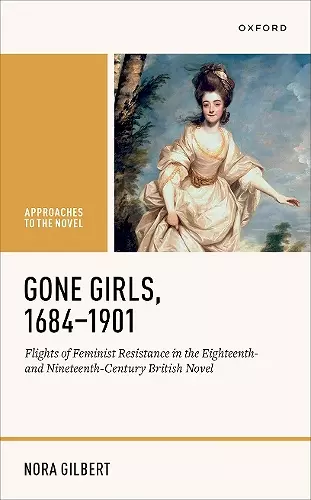Gone Girls, 1684-1901
Flights of Feminist Resistance in the Eighteenth- and Nineteenth-Century British Novel
Format:Hardback
Publisher:Oxford University Press
Published:3rd Jul '23
Currently unavailable, and unfortunately no date known when it will be back

In Gone Girls, 1684-1901, Nora Gilbert argues that the persistent trope of female characters running away from some iteration of 'home' played a far more influential role in the histories of both the rise of the novel and the rise of modern feminism than previous accounts have acknowledged. For as much as the eighteenth- and nineteenth-century British novel may have worked to establish the private, middle-class, domestic sphere as the rightful (and sole) locus of female authority in the ways that prior critics have outlined, it was also continually showing its readers female characters who refused to buy into such an agenda--refusals which resulted, strikingly often, in those characters' physical flights from home. The steady current of female flight coursing through this body of literature serves as a powerful counterpoint to the ideals of feminine modesty and happy homemaking it was expected officially to endorse, and challenges some of novel studies' most accepted assumptions. Just as the #MeToo movement has used the tool of repeated, aggregated storytelling to take a stand against contemporary rape culture, Gone Girls, 1684-1901 identifies and amplifies a recurrent strand of eighteenth- and nineteenth-century British storytelling that served both to emphasize the prevalence of gendered injustices throughout the period and to narrativize potential ways and means for readers facing such injustices to rebel, resist, and get out.
a fast-paced study ... [Gilbert's] fetching descriptions of this underexamined narrative feature make a compelling contribution * TLS, Devoney Looser *
This is a persuasive reading of a pervasive figure...Highly recommended. Upper-division undergraduates through faculty. * Choice *
Gone girls, then, through Gilbert's model of "flight as fight" continue to make their presence felt even in their absence--an effect that Gone Girls, too, has upon its readers, eliciting and complicating our sympathies. Just as the gone girls of eighteenth- and nineteenth-century novels continue to impact other characters and readers, Gone Girls will keep influencing our reading of histories of the novel and feminist movements well after we close the final page. * Brianna Beehler, EuropeNow *
Gilbert adroitly discusses how intersectionality affects the concept of mobility fiction, racism and slave narratives to the concept of runaway fiction, as well as giving a strong basis for why her critical approach is so needed to expand the critical history of the novel. Gilbert's work is focused and contextualizes the critical history, and her book is a much-needed and expert addition to the study of the important trends in analyzing the female-led narratives in the eighteenth and nineteenth century. * Marie Hendry, Nineteenth-Century Gender Studies *
This lively, compelling monograph makes a strong case for female flight as a central trope in the eighteenth- and nineteenth-century novel. It is a thoroughly enjoyable read, as well as a rigorous and informative contribution to the field of feminist literary criticism and novel studies more generally. * Clare Walker Gore, Open University *
Nora Gilbert's wide-ranging account of the runaway woman plot revises in eye-opening ways the received wisdom about the gender politics of the British novelistic tradition ... Accessible, smart, impassioned, and original, Gone Girls, 1684-1901 is a book to keep close at hand. * Deidre Lynch, Harvard University *
Gone Girls will inspire some of its readers to bolt directly back to eighteenth - and nineteenth - century novels that, as the author eloquently puts it, "remind us of the radical, often underestimated potency of running to break free". * Devoney Looser, The Times Literary Supplement *
ISBN: 9780198876540
Dimensions: 240mm x 162mm x 19mm
Weight: 444g
238 pages